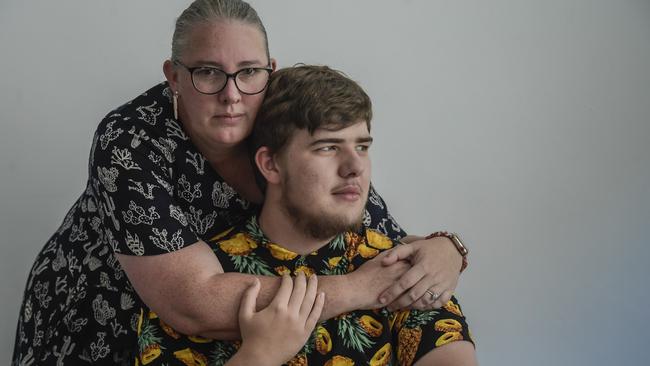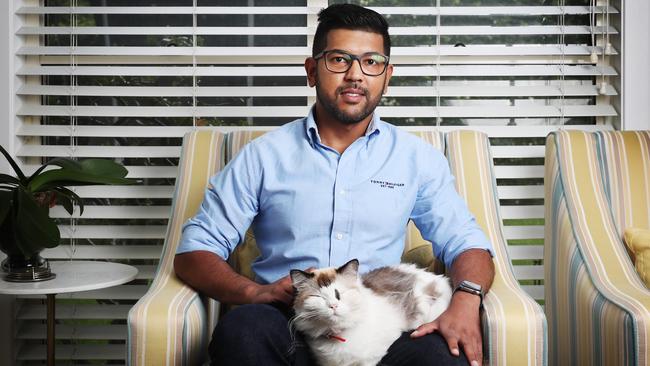Covid vax reactions may be rare but ‘no-fault’ compensation is rarer still
The federal government’s no-fault safety net for people who suffered very rare serious side effects from a Covid-19 shot has failed an Adelaide mum and her teenage son.

Adelaide mum Rachael Crabb wasn’t keeping a financial tally of expenses or time off work as she sat by her 15-year-old son’s hospital bed in the worrying days after he developed heart problems related to a Covid vaccine.
She had too much else on her mind, watching her grey-faced boy hooked up to monitors and struggling with severe chest pain while doctors debated what to do.
“It was really hard, watching this kid who was completely incapable of doing anything because he was in so much pain,” she said.
It was Christmas Eve 2021 when Ethan, now 16, was diagnosed with pericarditis (inflammation of the thin sac that surrounds the heart) related to his second Pfizer vaccine.
“The sac around his heart was full of fluid and eventually it was decided they’d have to do surgery to drain it manually,’’ Crabb recalls. “They inserted a tube between the sac and the heart and drained out 395ml of fluid.”
It wasn’t until months later, when Ethan was still recovering, that she looked up the federal government’s no-fault Covid vaccine claim scheme for people who’d had moderate to severe vaccine-related injuries.
And then she began to tally it up: the weeks she’d had off work, the travel costs and medications, the days of follow-up appointments and hospitalisations. Not to mention Ethan’s pain and suffering, just as he was about to enter year 11 at school.
“He was quite unwell for many months after his surgery and he struggled with the isolation, just not being able to see his friends, and then his self-appointed isolation because he doesn’t want to catch Covid,” she says.
Crabb works in the hardship department of one of the big banks and is adept at dealing with forms and processes. And so she gathered all Ethan’s medical documents that clearly stated “Pfizer-related pericarditis” and made a claim through the government scheme, only to be knocked back twice.
“I called the hotline I don’t know how many times to ask for advice, or what other documents I should provide, and was told there was nothing I could do,’’ she says.
Crabb was told they couldn’t claim because as a child, Ethan had not suffered financial impact. “And I can’t claim any financial impact because my requirement to care for him was the same whether he was sick or otherwise.
“This was a child who had to have surgery and we couldn’t get a single cent. I was pretty angry for a long time and then I just felt defeated and I put it away in the ‘I don’t want to deal with this anymore’ basket because it was making me upset.’’
In response to a questions, the Health Department said the scheme is only open to claims by a Covid-19 vaccine recipient and that costs of care may be claimable.
When the former Coalition government’s health minister Greg Hunt announced the scheme in mid-2021, he said it would provide a safety net for people who suffered very rare serious side effects from a Covid-19 shot. It would also indemnify health professionals administering the vaccine. More than a year on, a fraction of applicants have made a successful claim.
Since December 13, 2021, Services Australia, which administers the scheme, has received 3206 applications. Of these, just 109 claims, totalling $6.2m, have been approved. Some 2482 claims are in progress or awaiting further information, 232 have been withdrawn, and 383 refused.
Others who suffered rare but severe reactions to a Covid vaccine have told The Australian the scheme is difficult to navigate and the parameters too narrow. It is only applies to a set of approved adverse reactions in patients who were admitted to hospital.
Sydney chartered accountant Habib Khan, 36, suffered global heart failure secondary to myocarditis (inflammation of the heart muscle) after his first Pfizer shot, and deteriorated so quickly he ended up on life support with his family called in to say goodbye.

He’s still recovering and was compensated through the scheme but he says the process was complex and the payout did not reflect his losses: he spent a month in hospital, required many more months of rehabilitation, had to sell his house and move back in with his parents, and is only now able to work three days a week.
“In the end I took what they offered and moved on with life because I didn’t want to be stuck dealing with Services Australia for the next six months,’’ he says.
“The physical and mental impacts (from vaccine injury) are ongoing and people should know they won’t be fully supported.”
In response to questions about whether the scheme would be reviewed, the Department of Health said it was subject to regular stakeholder review.
Myocarditis and pericarditis are known rare side-effects of the mRNA vaccines Pfizer and Moderna and mostly occur in young men and teenage boys. In its most recent vaccine safety report, the TGA said it was still monitoring reports of these two conditions and noted that they are usually temporary, with most people recovering within a few days.
Rachael and Ethan know just how unlucky he was to be struck down with pericarditis days after his second Pfizer shot: “what happened to Ethan is incredibly rare,” his mum says.
More than 12 months on he has occasional flare-ups and scarring on his heart which is being monitored. He’s been exempted from any further Covid vaccines and takes great to care to ensure he doesn’t contract the virus.
“Ethan is the first to say, ‘go and get vaccinated’. He tells people that what happened to him was an exception and that in his opinion it’s better to be vaccinated than not,’’ Crabb says.







To join the conversation, please log in. Don't have an account? Register
Join the conversation, you are commenting as Logout